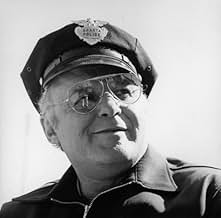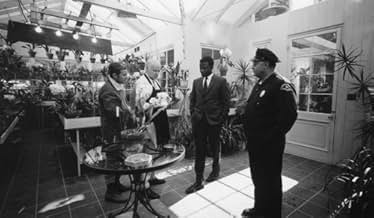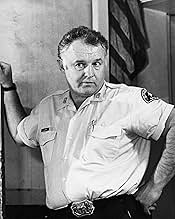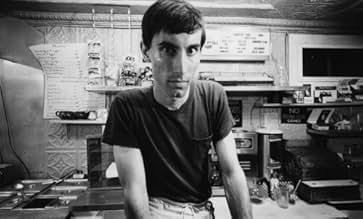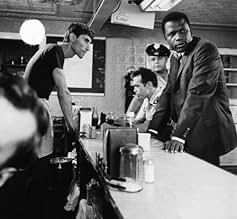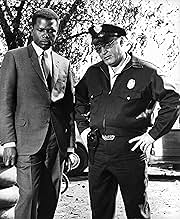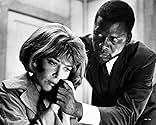Un policía afroamericano tiene que investigar el caso de un asesinato por motivos raciales en una hostil ciudad sureña.Un policía afroamericano tiene que investigar el caso de un asesinato por motivos raciales en una hostil ciudad sureña.Un policía afroamericano tiene que investigar el caso de un asesinato por motivos raciales en una hostil ciudad sureña.
- Dirección
- Guión
- Reparto principal
- Ganó 5 premios Óscar
- 23 premios y 16 nominaciones en total
William Watson
- McNeil
- (as William C. Watson)
Reseñas destacadas
A well-done film of the raucous Civil Rights era, and should be standard viewing in classrooms.
Here's my breakdown:
STORY: Up front, it's only lightly dramatic, fueled by the socially-supported bigotry of that era.
What's very clever about this film is the way the story reveals itself in stages.
It's one of the best stories in that regard; it actually just gets better as the film progressives.
If you're not interested in the race struggles of that era then this film may not interest you.
ACTING: Even with a swath of "dumb redneck" characters, the whole cast are believable and hold their characters well.
Of course, Poitier and Steiger are simply awesome on their own and fireworks together. Really superb blend.
TEMPO: An excellent pace with nothing hyper or dull. With Steiger there's a lot of yelling (as was his custom).
CINEMATOGRAPHY: Love old films, and settings all by themselves. If you want to step back into time and literally see what the "Old South" was like, watch this.
DIRECTING / WRITING: Excellent directing and writing ... so much attention to detail and the handling of the subject. My only critique is the screenplay was written by a man who did so primarily for TV, and it occasionally shows.
Is it a very good film? Yes.
Should you watch this once? A must.
Rating: 8.1.
Here's my breakdown:
STORY: Up front, it's only lightly dramatic, fueled by the socially-supported bigotry of that era.
What's very clever about this film is the way the story reveals itself in stages.
It's one of the best stories in that regard; it actually just gets better as the film progressives.
If you're not interested in the race struggles of that era then this film may not interest you.
ACTING: Even with a swath of "dumb redneck" characters, the whole cast are believable and hold their characters well.
Of course, Poitier and Steiger are simply awesome on their own and fireworks together. Really superb blend.
TEMPO: An excellent pace with nothing hyper or dull. With Steiger there's a lot of yelling (as was his custom).
CINEMATOGRAPHY: Love old films, and settings all by themselves. If you want to step back into time and literally see what the "Old South" was like, watch this.
DIRECTING / WRITING: Excellent directing and writing ... so much attention to detail and the handling of the subject. My only critique is the screenplay was written by a man who did so primarily for TV, and it occasionally shows.
Is it a very good film? Yes.
Should you watch this once? A must.
Rating: 8.1.
In order to understand what's happening in In the Heat of the Night you have to realize that it is set in a very specific time period. The Civil Rights Act had been passed in 1964 and the Voting Rights Act was passed in 1965. But the impact of those laws was only beginning to be felt.
Especially the Voting Rights Act. The town of Sparta, Mississippi where William Schallert was Mayor and Rod Steiger was sheriff now has a significant new voting population and blacks might be a majority in that county. But even if they aren't, they know have a voice in the electoral process. Someone like Steiger has to take that into account now. Of course some of his deputies might not yet be with the program which explains why when a murder/robbery is committed of a very prominent northern businessman, Warren Oates sees fit to roust Sidney Poitier who's an unfamiliar black face in that town.
What a surprise they all get when they find out he's a top Philadelphia, Pennsylvania homicide detective and when his identity is established, his boss in Philly offers his services.
Poitier and Steiger both have to work through their prejudices, how each sees the other to solve this mystery which writer Stirling Silliphant gives us several red herrings before we learn the truth. Though Steiger got the Oscar for Best Actor, it should really have been a joint award. Their conflict and growing respect for each other drives the film. Steiger needs his expertise and respects him for that and Poitier comes to respect Steiger for his honesty.
Norman Jewison got great performances from his stars and the supporting cast of whom Warren Oates as the dimwit redneck deputy really shines.
Though set in a very narrow period of our history, In the Heat of the Night holds up very well with some eternal truths in its story. And it's the story of times that were a changing as one spokesman of the sixties put it.
Especially the Voting Rights Act. The town of Sparta, Mississippi where William Schallert was Mayor and Rod Steiger was sheriff now has a significant new voting population and blacks might be a majority in that county. But even if they aren't, they know have a voice in the electoral process. Someone like Steiger has to take that into account now. Of course some of his deputies might not yet be with the program which explains why when a murder/robbery is committed of a very prominent northern businessman, Warren Oates sees fit to roust Sidney Poitier who's an unfamiliar black face in that town.
What a surprise they all get when they find out he's a top Philadelphia, Pennsylvania homicide detective and when his identity is established, his boss in Philly offers his services.
Poitier and Steiger both have to work through their prejudices, how each sees the other to solve this mystery which writer Stirling Silliphant gives us several red herrings before we learn the truth. Though Steiger got the Oscar for Best Actor, it should really have been a joint award. Their conflict and growing respect for each other drives the film. Steiger needs his expertise and respects him for that and Poitier comes to respect Steiger for his honesty.
Norman Jewison got great performances from his stars and the supporting cast of whom Warren Oates as the dimwit redneck deputy really shines.
Though set in a very narrow period of our history, In the Heat of the Night holds up very well with some eternal truths in its story. And it's the story of times that were a changing as one spokesman of the sixties put it.
'In the Heat of the Night' was the winner of five Oscars with Norman Jewison for Best Director and the sound editing also receiving nominations, all richly deserved, especially the Best Picture and Best Actor.
Although the Best Picture was a strong one, apart from 'Doctor Doolittle', 'In the Heat of the Night' this reviewer finds the best of the five and also one of the greatest films of the 60s.
Visually, 'In the Heat of the Night' is an incredibly well-made film with cinematography that's both beautiful and gritty. It is immaculately directed also by Norman Jewison, who directed several other great films, and film and sound editing are also very good, fluid with a suitable unpleasantness which suits the atmosphere well and thrillingly authentic. Quincy Jones' soundtrack at least fits and evokes some good atmosphere, the title song sung by Ray Charles is a classic.
The script is incredibly thought-provoking with the racial tension tensely and vividly drawn, never resorting to heavy-handedness or talking at you, something that films with heavy subjects don't always achieve. The "they call me Mr Tibbs" line is iconic. The story is a gripping powerhouse and very ahead of and daring for its time with tremendous power, edge and emotion.
Characters are compelling, and the acting couldn't have been better. Rod Steiger has never been better as the bigoted police chief, and Sidney Poitier matches him every step of the way in a subtler and no less powerful performance. Warren Oates and Anthony James stand out in the uniformly strong supporting cast.
Overall, fantastic film and one of the greatest films of its decade. 10/10 Bethany Cox
Although the Best Picture was a strong one, apart from 'Doctor Doolittle', 'In the Heat of the Night' this reviewer finds the best of the five and also one of the greatest films of the 60s.
Visually, 'In the Heat of the Night' is an incredibly well-made film with cinematography that's both beautiful and gritty. It is immaculately directed also by Norman Jewison, who directed several other great films, and film and sound editing are also very good, fluid with a suitable unpleasantness which suits the atmosphere well and thrillingly authentic. Quincy Jones' soundtrack at least fits and evokes some good atmosphere, the title song sung by Ray Charles is a classic.
The script is incredibly thought-provoking with the racial tension tensely and vividly drawn, never resorting to heavy-handedness or talking at you, something that films with heavy subjects don't always achieve. The "they call me Mr Tibbs" line is iconic. The story is a gripping powerhouse and very ahead of and daring for its time with tremendous power, edge and emotion.
Characters are compelling, and the acting couldn't have been better. Rod Steiger has never been better as the bigoted police chief, and Sidney Poitier matches him every step of the way in a subtler and no less powerful performance. Warren Oates and Anthony James stand out in the uniformly strong supporting cast.
Overall, fantastic film and one of the greatest films of its decade. 10/10 Bethany Cox
Gritty realism and a strong performance by Rod Steiger rev up the technical quality of this taut drama about a visiting Northern Black detective named Virgil Tibbs (Sidney Poitier) who gets nailed as a suspect, foolishly, in the murder of a local VIP, in a small town in Mississippi. Eventually, the town's White police chief, the gum chewing Gillespie (Rod Steiger), accepts Tibbs' innocence. And the two of them then work together, reluctantly, to solve the case.
Forty years after the film was made, the racial themes seem just a tad heavy-handed. Whites are always backward and racist. And Tibbs is smart, urbane, and sophisticated. But back in the 1960s, the filmmaker probably did need to be blunt. And the point is made that Blacks and Whites, working together, can accomplish worthy aims, even though old Black Joe is still pickin' cotton at the Endicott Cotton Company.
As a whodunit, the story is fairly good, convenient coincidences notwithstanding. The clue to the killer's identity is pleasantly subtle.
The film's cinematography and production design are terrific. Many scenes take place at night. And the opaque lighting makes for a moody, slightly dangerous look and feel. Loved how they photographed that train moving down the tracks in the Mississippi darkness, a metaphor related to the film's theme. And the sound of a train whistle adds to the mournful realism.
Interiors look authentic. The masking tape that covers rips in a big leather chair in Gillespie's shabby office is so true to life. A single white light bulb hangs down from the ceiling in a small neighborhood grocery store, where the shelves are filled with empty fruit jars. And that greasy spoon called Comptons reeks of 1960's Southern rural reality.
My only complaint with this film is the background music. Some of the jukebox songs are not consistent with the film's overall tone.
"In The Heat Of The Night" is a technically well made, and quite interesting, murder mystery. Yet, it will always be remembered, rightfully, as the film that offered hope of racial harmony, during a decade in which there was none. Its "Best Picture" Oscar award is thus explained.
Forty years after the film was made, the racial themes seem just a tad heavy-handed. Whites are always backward and racist. And Tibbs is smart, urbane, and sophisticated. But back in the 1960s, the filmmaker probably did need to be blunt. And the point is made that Blacks and Whites, working together, can accomplish worthy aims, even though old Black Joe is still pickin' cotton at the Endicott Cotton Company.
As a whodunit, the story is fairly good, convenient coincidences notwithstanding. The clue to the killer's identity is pleasantly subtle.
The film's cinematography and production design are terrific. Many scenes take place at night. And the opaque lighting makes for a moody, slightly dangerous look and feel. Loved how they photographed that train moving down the tracks in the Mississippi darkness, a metaphor related to the film's theme. And the sound of a train whistle adds to the mournful realism.
Interiors look authentic. The masking tape that covers rips in a big leather chair in Gillespie's shabby office is so true to life. A single white light bulb hangs down from the ceiling in a small neighborhood grocery store, where the shelves are filled with empty fruit jars. And that greasy spoon called Comptons reeks of 1960's Southern rural reality.
My only complaint with this film is the background music. Some of the jukebox songs are not consistent with the film's overall tone.
"In The Heat Of The Night" is a technically well made, and quite interesting, murder mystery. Yet, it will always be remembered, rightfully, as the film that offered hope of racial harmony, during a decade in which there was none. Its "Best Picture" Oscar award is thus explained.
Outstanding performances from Poitier & Steiger in a film that's genuinely shocking once you consider the prejudice and evil it contains, even more so when you witness those same traits in society over 50 years later. Will we ever learn!
Oscars Best Picture Winners, Ranked
Oscars Best Picture Winners, Ranked
See the complete list of Oscars Best Picture winners, ranked by IMDb ratings.
¿Sabías que...?
- CuriosidadesSidney Poitier insisted that the movie be filmed in the North because of an incident in which he and Harry Belafonte were almost killed by Ku Klux Klansmen during a visit to Mississippi. That's why Sparta, IL, was chosen for location filming. Nevertheless, the filmmakers and actors did venture briefly into Tennessee for the outdoor scenes at the cotton plantation, because there was no similar cotton plantation in Illinois that could be used. Poitier slept with a gun under his pillow during production in Tennessee. He did receive threats from local racist thugs, so the shoot was cut short and production returned to Illinois.
- PifiasThe police chase Harvey Oberst through the yellow leaves of an autumn forest, clearly indicating that it is not the middle of summer, as claimed in the movie. This film takes place in September, as indicated by the calendar in the Sheriff's office and not summer.
- Citas
Gillespie: Virgil? That's a funny name for a nigger boy that comes from Philadelphia. What do they call you up there?
Virgil Tibbs: They call me MISTER TIBBS!
- Créditos adicionalesNo uppercase ("capital") letters are used in the opening and closing credits, including the film's title, cast and characters, crew and job titles, and company credits.
- Versiones alternativasThe VHS prints use the 1982 United Artist variant.
- ConexionesFeatured in Film Review: Film Review (1967)
- Banda sonoraIn the Heat of the Night
Music by Quincy Jones (uncredited)
Lyrics by Alan Bergman (uncredited) and Marilyn Bergman (uncredited)
Sung by Ray Charles
Selecciones populares
Inicia sesión para calificar y añadir a tu lista para recibir recomendaciones personalizadas
Detalles
- Fecha de lanzamiento
- País de origen
- Idioma
- Títulos en diferentes países
- En la calor de la nit
- Localizaciones del rodaje
- Sparta, Illinois, Estados Unidos(Sparta, Mississippi)
- Empresa productora
- Ver más compañías en los créditos en IMDbPro
Taquilla
- Presupuesto
- 2.000.000 US$ (estimación)
- Recaudación en todo el mundo
- 27.669 US$
- Duración1 hora 50 minutos
- Color
- Relación de aspecto
- 1.85 : 1
Contribuir a esta página
Sugerir un cambio o añadir el contenido que falta

Principal laguna de datos
What is the Hindi language plot outline for En el calor de la noche (1967)?
Responde



